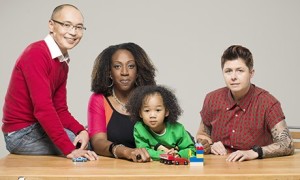 Demographers are noting the rise of “co-parenting”—a new movement involving contract-based parenting that is challenging the definition of family.
Demographers are noting the rise of “co-parenting”—a new movement involving contract-based parenting that is challenging the definition of family.
The rise of co-parenting is largely due to the Internet, where numerous websites allow individuals to meet a parent online. Co-parenting allows unmarried people to find other individuals who are willing to have children together.
Today, co-parenting is largely popular among homosexual men and women who want to have children. However, co-parenting also appeals to individuals who want to experience parenthood without the “trouble” of committed, long-term marriage relationships.
Normally, co-parent hopefuls browse online databases, looking for another person who would match their interests and personalities. Overall, the premise behind co-parenting is that parenthood does not have to be based on love and commitment, but can instead be founded upon a contract where both parents share child-rearing responsibilities.
“All a child needs to develop and grow is attention, encouragement and love,” says Ivan Fatovic, founder of one of today’s most popular co-parenting sites. “A modern family unit can provide that as well a traditional one. We’re all looking for healthy, happy, and balanced children.”
“Growing divorce rates combined with people waiting increasingly longer to get married and have children are leading indicators pointing towards a society where co-parenting has the potential to be much more prevalent,” he added.
Earlier this month, ABC News highlighted the story of Rachel Hope of Los Angeles. Hope has two children, ages 22 and 4, who were both raised with different fathers. Now, Hope is searching for yet another man to serve as a co-parent.
“If you’re blessed to meet a soul mate and you just gel and it works and you have children, that’s ideal, no one is disputing that,” Hope told the news outlet. “But what about the rest of us who didn’t meet that person, or not in time?”
Co-parents say they are pleased that the nuclear family is no longer the only accepted societal norm.
“I spent 15 years of humiliation with people turning me down while I was looking for a third co-parent because everyone thought I was weird,” Hope told The Guardian. “But now … I can pretty much have my pick of many, many fabulously qualified men.”
However, despite the rapid rise in co-parenting, many experts maintain that the traditional, nuclear family structure is healthiest for both children and societies. Dr. Robert Fellmeth, executive director of the Children’s Advocacy Institute, told ABC News that commitment between husbands and wives is essential.
“I’m a 19th century romantic in saying that there is an advantage in at least trying to have the relationship between the parent that’s deep and meaningful and goes beyond simply the mutual desire to have a child,” he said. “The child benefits from having two parents who love each other, who are willing to sacrifice for each other.”
Andreas J. Kostenberger, a professor at Southeastern Baptist Theological Seminary, writes in a Family Research Council article that, according to the Bible, “marriage and the family are not human conventions based merely on a temporary consensus and time-honored tradition.”
“Instead,” Kostenberger explains, “Scripture teaches that family was God’s idea and that marriage is a divine, not merely human, institution. The implication of this truth is significant indeed, for this means that humans are not free to renegotiate or redefine marriage and the family in any way they choose but that they are called to preserve and respect what has been divinely instituted.”
“This is in keeping,” Kostenberger continues, “with Jesus’ words, uttered when his contemporaries asked him about the permissibility of divorce: ‘What therefore God has joined together let not man separate’ (Matthew 19:6). For this reason, marriage is far more than a human social contract; it is a divinely instituted covenant.”
Photo: The Guardian
Become a Christian News Network Supporter...


